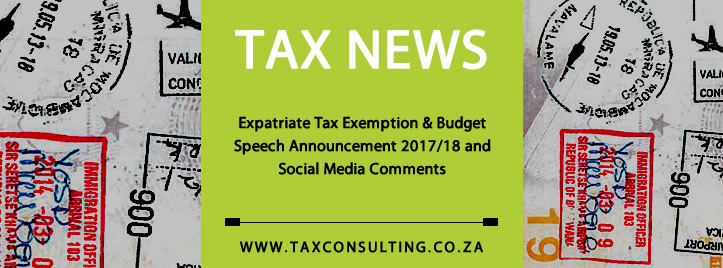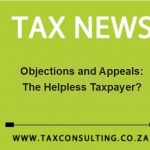Expatriate Tax Exemption & Budget Speech Announcement 2017/18 and Social Media Comments
Further to the Budget Announcement on proposed amendment to section 10(1)(o)(ii), the exemption section referred to often as the so-called 183-and-60-day rule; we have seen extensive commentary on social media on the impact of this section.
Those who have followed the comments will resonate with the various layman views expressed. The comments have ranged from that this is fake news and some have listened to the whole budget speech and found no reference thereto (needless to say this is a misunderstanding of the budget process and incorrectly assumes that the Parliamentary speech notes the technical tax law changes – tax professionals normally skip the speech, but deeply study the tax technical papers published by National Treasury); to comments that there is nothing to worry about (which may apply to some, but no-one should do international tax planning applying the ostrich principle); to perhaps the more close-to-correct views expressed that you need to carefully consider your tax residency status, to determine the impact of the change.
We have been inundated with questions on the announced expatriate tax law change and whilst the draft legislation has not been published for comment yet, there are some points which may be made with technical certainty; for a better informed South African expatriate view on tax planning and compliance.
- The tax law change will become effective either 01 March 2017 or 01 March 2018. We disagree with the view that the law-change will necessarily be effective 01 March 2018 onwards only. There is a rally for more tax collection and this is sometimes applied arguably unfair, even retrospective. A good example in the Budget 2017/18 announcement is the dividend tax-increase from 15% to 20%, which became effective the 22nd of February 2017, the day of the Budget Speech. Should the draft legislation indicate the effective date as 01 March 2017, effectively retrospective, we will make submission to National Treasury as well as the Parliamentary Portfolio Committee hereon. However, it should be noted that the effective date may very well be promulgated sooner, so in the interest of conservatism, the prudent time to review one’s tax affairs is immediately.
- This law change only impacts employees who are tax resident in South Africa. This is the aspect which created the most confusion by various layman commentators; and whilst we appreciate that everyone is entitled to a view (every tax court case in South Africa, results from the taxpayer and SARS having different views, the problem is that SARS has a recent win ratio of just over 68%), one does wonder why some of these social commentators feel the need to express themselves on something they have no technical understanding of.
- To debunk these mistruths and give you a head-start to up-skilling yourself you may consider familiarising yourself with the below information –
(a) Tax residency is a term defined in the Income Tax Act, No 58 of 1962 (“the Act”) and which has effectively three components. The most important component, for purposes of this note, is determination of when a person is “ordinarily resident” in South Africa. This term has been developed in case law for over half a century and the technical correct document hereon is SARS Interpretation Note 3, which explains SARS’ view This can be accessed from the SARS website or you are welcome to email contact@taxconsulting.co.za and we will send on a copy. This interpretation note is a useful start, but we recommend a reading of both the leading South African cases of Cohen v CIR (13 SATC 362) and CIR v Kuttel (54 SATC 298).
(b) Becoming non-resident for South African tax purposes, therefore, is a subjective test, as supported by objective factors. It should be noted that this has absolutely nothing to do with having a work permit or residency permit somewhere else, how long you have been outside South Africa or whether you disagree with taxpayer money applied to Nkandla. Also, non-residency for tax is not something you automatically assume, because you have decided to not pay South African tax. It would be nice to sit on your porch and unanimously decide that your days of paying South African tax are all over; and that is the end of your tax filings and contribution to the South African fiscus, but that is unfortunately not how global tax compliance works. The rub comes when SARS audits you and / or you are reported under FACTA. This is where confidence quickly evaporates with the non-compliant taxpayer. Some aspects to consider –
i. The date when you became non-resident will be verified by SARS as when you should have disclosed a “deemed disposal” for capital gains’ tax purposes. As a resident, you would have paid tax on world-wide income including on world-wide capital gains. When you became non-resident, SARS’ taxing right ends on most assets (there are some exclusions), therefore, SARS collects CGT on the capital gains on your assets up to the point of becoming non-resident. Where you have failed to do this correctly, you can correct with a SARS VDP, but this again is a complex area in which you would need professional assistance.
ii. Where your intention was genuinely to become non-resident, you should have completed financial emigration through the Reserve Bank. This is a legal requirement where you claim to be not ordinarily resident for exchange control purposes, albeit part of Exchange Control Regulations and not the Income Tax Act. There is no argument with SARS where you claim to be not ordinarily resident for tax, but have not formally emigrated. This does not impact your ability to use your South African passport, but does change your banking arrangement on how you move money and other fiscal rules. Luckily, you can retrospectively emigrate through the Reserve Bank and whilst we do not deal therewith, as the admin and bureaucracy does not excite us, there are two competent specialist providers to whom we regularly refer those needing assistance.
iii. Where you annually return to South Africa after your wanderings, as evidenced by your passport, you would not have much traction claiming to be South African resident. You can get a formal tax opinion from a tax advisor confirming that you are non-resident in South Africa, however, SARS no longer issues Binding Private Rulings hereon. We can share a sample sanitised Ruling (taxpayer details deleted; should you not be able to find this on the SARS website, feel free to ask contact@taxconsulting.co.za).
iv. The biggest mistake a South African expatriate can make is where they claim to be non-resident for South African tax, but is later found after they retire to South Africa, to have been tax resident all along. Then you have risked your whole retirement planning on incorrect reasoning, so please be extremely careful when you foresee that you may return to South Africa. Then it is better to remain tax resident and implement good tax planning principles.
(c) Tax treaties have very limited application, as you need to evidence that you are tax resident in a double tax treaty (“DTA”) country. Where you claim DTA relief, the deemed disposal capital gains tax rule still applies to you. Tax treaties will also never exempt you from the taxing right in your country of residency. They only determine which country may tax you first and which country must give credit for taxes paid, as far as employment income for tax residents are concerned. Please read article 14 or 15 (dependent personal services) in the applicable DTA, before making a general statement on the use of DTA’s. They are all the same as framed on the OECD Model Tax Convention and the OECD Model and Commentary thereon, is compulsory reading for anyone before claiming a tax treaty exempts you from South African taxes. Again, contact contact@taxconsutlting.co.za should you be unable to find reference.
- Where you are South African tax resident, you should have disclosed your world-wide taxes in an annual SARS tax submission. Just submitting a zero tax return or leaving out the offshore employment income is incorrect. You may get away with this for a period, but some of our most complex audits and settlements on the steps of the Tax Court have happened where SARS audits this long after the expatriate has returned, claiming the return was never done correctly and the exemption never properly claimed. When SARS verifies this tax exemption claim [you must disclose your foreign employment income and the claim the corresponding tax deduction where indicated in your tax return] the request is for copies of passport (to show you meet the days’ requirement) and copy employment contract (to show you meet the employment requirement).
- In future, on the anticipated law change, you will also need to evidence that the income was taxed in another country. This would obviously mean income tax on the employment income and not VAT, dividends tax or corporate tax (apologies to the reader, but some social media commentators, remarkably suggested because they will start paying VAT in Dubai, the income tax change will have no impact on them).
- There will remain planning to significantly reduce taxes on offshore employment income through legitimate structuring. We will deal herewith as the draft legislation is published and obviously, this is more for our clients. The principle will be that tax residency must first be considered; and where broken, this must be done in a manner that the taxpayer can discharge the onus of proof (including CGT deemed disposal and financial emigration).
- Where the taxpayer remains tax resident, South African expatriates abroad must accept that the days of earning completely tax-free are over. Some tax will have to be paid, and this can be achieved with proper and pro-active planning, depending on the expatriate circumstances and level of employment income. The important measure here for your tax provider is someone who can not only do tax planning, but also guarantee proper follow-through to ensure that the purported planning is accepted by SARS on assessment and survives detailed audit.
We sincerely hope this article assists in better informed social media commentary and ultimately for South African expatriates to be better planned whilst remaining fully tax compliant. Our vested interest in providing this information is that perhaps some high net worth and / or up and coming wealth creating South African expatriates, will consider becoming our clients.



